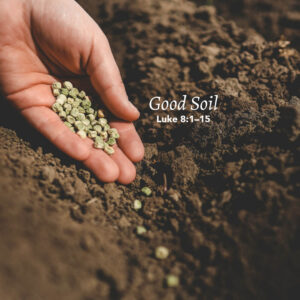Luke 8:1-15: Good Soil
July 4, 2025
TODAY'S BIBLE READING:
1 Chronicles 7-9, Psalm 127, Luke 8:1-15, Colossians 2:8-15

Luke 8:1-15:
Jesus continues to preach and evangelize the kingdom of God. The twelve disciples are with him as are Mary, Joanna and Susanna. Mary had had “seven demons” cast out of her—a surely dramatic conversion. Joanna was from a more reputable background, indeed of high influence, the wife of Herod’s household manager—her conversion was nonetheless radical if less dramatic. And then Susanna, who is neither elite nor charlatan in background—but whose conversion, if more standard by the world’s standards, is also radical and real. Note: it is possible for us to judge people by where they came from, but what matters is not what our background is but what our response to the gospel is. Your conversion story may be dramatic, or not; your background may be elite, or not; you may come from a so-called “normal” background, or not. All that matters is: do you know and follow Jesus?
Jesus tells then his famous parable of the sower. Throughout this story there are various subtleties, but the key point to remember is that there is the same seed, but different responses. We often think that what determines the fruit is the quality of the seed. Not so: if the seed of the gospel is being sown, the determinative factor is what kind of heart receives the word. The good soil, that produces good fruit, is those with an “honest and good heart”; that is who receive frankly and openly the Word of God. If you are an evangelist, then, do not be tempted to change the message to get better results. What must change is not your message, but the hearts of the people to whom you preach. Pray then that God would sovereignly soften hearts. And let us receive God’s Word today with frank and honest and open hearts.
Jesus here also explains why he tells parables (Luke 8:10). The reason is the reverse of what preachers often tell us. Jesus did not tell stories because stories make things clearer. It is so that “seeing they may not see, and hearing they may not understand.” However, this does not quite mean that the point of the parables is to obscure truth, either. It is a quote from Isaiah 6 and the great prophet’s commission. Jesus is saying that parables act as a “sieve”: it generates interest and intrigue, keeps out those who are merely there to find an excuse to persecute and kill Jesus, and to the honest and frank heart, “to you it has been given to know the secrets of the kingdom of God.” The task of a preacher is to make the truth clear. The task of a hearer is to receive that truth. And parables function to draw in those in whom God is at work.
Would you today receive God’s Word like the “good soil”?
ABOUT THE AUTHOR
Josh Moody (Ph.D., University of Cambridge) is the senior pastor of College Church in Wheaton, IL., president and founder of God Centered Life Ministries, and author of several books including How the Bible Can Change Your Life and John 1-12 For You.
WANT MORE?
To receive God Centered Life devotionals directly in your inbox, as well as other resources, enter your email address in the form at the bottom of this page and click "subscribe."

